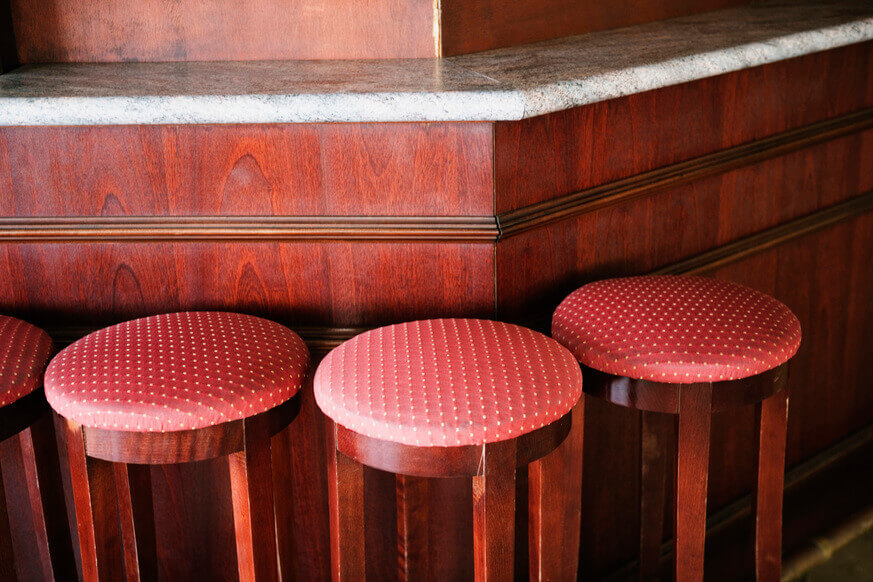Blog Post
Famous Entrepreneurs Walk into a Bar

Estimated Reading Time: 11 minutes.
What if three famous entrepreneurs from Canada walked into a bar and sat on stools next to each other? Odds are they would strike up a conversation and soon discover they have many common characteristics that led to their success. Their meeting might go something like this . . .
The Introduction
The eldest man at the bar extends his hand and humbly introduces himself. “Hi, I’m Jim Pattison.” His smile and approachable nature belie the fact he is the sole owner of the second largest private enterprise in Canada: The Jim Pattison Group.
Company holdings include broadcast media, signage, supermarkets, fishing, forestry, agriculture, equipment, manufacturing, recreation and marketing, and entertainment, including Guinness World Records and Ripley’s Believe It or Not!
With annual revenue of $10 billion and over 45,000 employees, this 90-year old is still a hands-on operator and going strong. He is also a huge philanthropist, donating millions annually through his charitable foundation.
“Hi, I’m Garrett Camp,” responds the 40-year old sitting next to him. He’s animated, but his casual dress and laid back nature would never suggest he’s the founder of StumbleUpon and co-founder of Uber; two paradigm-busting tech companies.
He sold StumbleUpon to eBay for $75 million and then bought it back again. His stake as co-founder in Uber is worth $6.2 billion today. Now he helps others develop and launch new products through his new startup studio, Expa. He’s also building his own cryptocurrency to link the existing regulated banking system with new unregulated monetary systems.
Finally, the gracious man with a smile extends his hand and responds, “Hello. I’m Alain Bouchard.” This gentle, welcoming 60-year old man founded a huge independent multinational chain of 15,000 convenience stores, including Mac’s and Circle K. The company generates $38 billion in revenue annually. His charitable foundation also donates millions to arts and culture and to help those with intellectual challenges.
Their Roots

Garrett speaks up after the introductions.
“I’ve heard of you both. You’re very successful entrepreneurs, but most high net worth individuals started with family money. Did you?”
Jim chuckles and responds, “Hardly. My dad was a partner in a car dealership and lost everything during the depression. After that he went door-to-door repairing pianos for $2. What about you, Garrett?”
“My dad was an architect and contractor. Mom was a designer and artist. We grew up in a middle-class neighbourhood in Calgary. I think growing up in a self-driven household was part of the reason I became an entrepreneur, but we weren’t rich.”
Alain chimes in, “Dad owned an excavation company and Mom managed the company’s finances. Dad needed new heavy equipment for a job, but the person he had an agreement with went bankrupt, so Dad did too. I was nine-years old and it was a very difficult time for the family. It took Dad ten years to repay his debts.”
Their Business Beginnings
“Wow. That must have been tough for both of you,” said Garrett. “What made you want to work for yourself after your parents’ failures?”
Alain responded, “After my father’s business failure, it became my great desire to restore my parents’ honour. I worked in a factory and then worked for my brother without pay to help him manage a franchise grocery store. I liked greeting the customers, and I discovered I have an innate sense of interior design.”
“When my brother’s supervisor visited the store, he gave me a job organizing the new franchise stores since he was so impressed with my work. I did that for a few years and then later managed and became a territory manager and director. I left to work for a competitor, but I always knew I wanted to own my own store and took business classes.”
Garret asked, “What about you, Jim?”
“I can never remember not working. When I was seven years old I started selling garden seeds door-to-door. Later, I played the trumpet at church picnics. In high school, I picked fruit, sold doughnuts and subscriptions to magazines, worked in a hotel as a page boy, and delivered newspapers.”
“When I finished school, I worked in a cannery and packing house, built bridges, and then worked on the CPR as a dining car attendant. Later, I washed cars at a gas station with a used-car lot. I sold my first car when the salesman was off the lot,” Jim laughed.
“What’s your story, Garrett?” asked Jim.
“I went to university and studied electrical engineering, and later earned a graduate degree in software engineering. I always knew I wanted my own business. I kicked around ideas with a couple of friends and we came up with an idea. I thought it was great and got really excited. I wanted to make it happen and I was passionate about creating the product,” said Garrett.
Their Risk Tolerance
“Did you take risks to make your idea become a reality, Garrett?” asked Jim.
“Yes. Investors in my area didn’t see the potential. I lived in a city where oil and gas reigned – not technology. I had to look for money elsewhere, and I’d invested every dime and many hours into the project. Eventually, I found seed money in San Francisco, but it wasn’t easy. I put everything on the line,” said Garrett.
“What about you, Jim?” asked Garrett.
“When I was 32, I needed financing for my first GM dealership. I took out a loan on my life insurance and house. I had to convince the bank manager to lend me eight times the branch limit. I borrowed the rest from GM,” said Jim.
“What about you, Alain?” asked Garrett.
“I worked two stores myself when I started. One of the companies was in a franchise network. I told them I wanted to start my own store and they said they couldn’t afford to lose me since I was the only one with the experience they needed. I told them I would only stay with them if they would give me two franchises. They said yes. My banker told me I was too aggressive and I was growing too fast. I changed bankers,” said Alain.
Their Passion

“Jim, you’re 90-years old. Why haven’t you retired?” asked Garrett.
“I have fun going to work every day,” Jim said. “I like what I do and so I just keep doing it. I get up at 6 am every day.
Years ago, I left my job at GM for a guaranteed $50,000 a year selling pots and pans. I went back to GM for $12,000 a year because that was where my heart was. I learned that it isn’t enough to simply make a lot of money.”
“What about you, Garrett?” asked Jim.
“I fell in love with computers when I was 10-years old. My uncle lent me his Macintosh Plus for the summer. After that, I wanted to learn everything about computers and the internet. I’m still learning, and I still love what I do,” replied Garrett.
Alain clearly relates and says, “Life is too short to spend on doing something you don’t like. If you don’t like what you are doing, you should do yourself a favour and leave. It comes down to attitude. If you have a good attitude, keep your ego in check, and work hard at something you enjoy, you will be successful.”
Their Customer Focus
How important is customer focus to you, Garrett?” asked Alain.
“StumbleUpon is all about the user. It’s a community-driven tool to help people find webpages that interest them. I always think about one user action and then design the product around it. That’s what I did with Uber. I believe it is very important to seek and capture feedback too,” said Garret.
“What about you, Jim?” asked Alain.
“The customer is always my priority, no matter what our business decides to do. I wouldn’t have a business without them. It’s not about me; it’s about customer satisfaction,” responded Jim.
“I agree,” said Alain. “When you know who your customers are, that can give you an edge on the competition. Customer service has to be part of our DNA every day. It has to be a part of your thinking every day.”
Their Ability To Seize Opportunities

Do you think it’s harder to build a business today?” asked Garrett.
“No, easier,” answered Jim. “There’s much more access to capital and there’s much more change today. Anytime there’s change, there’s opportunity. I don’t think I’ve ever seen more opportunity for young people than today – ever.”
“How did you come up for the idea for Uber, Garrett?” asked Alain.
“I was waiting for half an hour for a cab and it made me late for an appointment. I saw many taxis whiz by and many were empty. I knew there had to be a better way than using an old, uncoordinated dispatch system. I checked the App Store on my iPhone and didn’t see a solution.”
“What about you, Alain?” asked Jim.
“I knew I wanted my own business, so I grabbed every opportunity that came my way until I had two franchise stores. My strategy has always been to look for opportunities, which later included snatching up my competitors,” said Alain.
Their Determination
“Have you ever failed, Jim?” asked Garrett.
“We all fail – I have failed so many times, but it never discourages me. I just pick up and go,” answered Jim. “If you owe the bank enough money, you decide what you have to do to pay your bills,” he explained.
Garrett responded, “I understand. People don’t realize it takes a little time to get a system up and running and everyone forgets the first couple of years, because you are toiling in obscurity. Every time I make a mistake with a company, I write it out and try to figure out why it happened.”
“I definitely see a correlation between how many things a company gets right and how fast a company grows. You face plenty of adversity. People said Uber wouldn’t work in New York because taxis were too easy to get. Later, we had plenty of bad press and operational issues,” said Garrett.
“And you Alain?” asked Garrett.
“My father was ill-prepared to run a business. He lacked good counsel and poorly managed the debts owed him. I was determined to do things right, but I certainly had many setbacks along the way. You learn from your mistakes and do better the next time,” said Alain.
Their Work Ethic
“What are entrepreneurial characteristics a person needs for success, Jim?” asked Garrett.
“Well, first thing is total honesty, integrity, hard work, and caring about the customer. Remember, it’s not what you like. It’s what they need,” responded Jim.
“What about you, Alain?” Garrett asked.
“My father told me you have to first make your name. You only have one. The most important asset anyone has is their reputation, not money.”
“What’s your take, Garrett?” asked Jim.
“Absolutely, you need to decide what’s important. For example, the decision to replace our Uber CEO was very difficult, but we knew we had to improve our culture and practices,” said Garrett.
Their Strong Teams

“Did you go it alone, Garrett?” asked Alain.
“No. I teamed up with friends for my first business while I was at university. In the case of Uber, I had the idea for about a year. I had registered Ubercab.com early on. I was working on the prototype, and it was all very casual. And then my cofounder Travis Kalanick saw it. He got the vision and became my most active collaborator on the product.”
“You want people who are really passionate about the idea. I would rather have someone who is super-passionate about the #3 idea on my list than me taking my #1 idea and trying to get people onboard,” said Garrett.
“And you, Alain?” asked Garrett.
“When I started my company I wanted to build a big foundation to make sure we were on a solid base and then we could build a house. I discovered early in my career as an entrepreneur that I’m not good at many things, and I said, ‘I need help.’”
“I surround myself with good people. My father lost everything, because he was not well-surrounded. So I searched for the right people to help me with the things I was not good at. You need a partner to help you build your dream,” said Alain.
“Did you go it alone, Jim?” asked Alain.
“No. You need a good team if you want to grow. Today, I have a team that looks at 300 to 400 deals every year. I give my divisions leeway to do what they like, as long as they meet targets, although I still look at the books of every company on Monday mornings. I’m very results focused,” said Jim.
*****
While the chances of these three meeting in a bar might be remote, what’s written here comes from the interviews and the entrepreneur quotes of these three successful businessmen.
If you can relate to what you’ve read, it’s time to nourish your entrepreneurial spirit and discover financial freedom. Postcard Portables has franchise opportunities throughout Canada. It is simple to get started operating your home-based business.
Our highly-respected brand and franchise network offers unlimited growth potential for a low investment amount. Ask yourself: Are you ready to make a mark in your community and have the work/life balance you deserve? If so, then it’s time to sign. Contact us to learn more.
Blog Search
Recent Blogs
- How Customer Service Brings World Peace
- High five to postcard portables! 5-year cfa franchisees’ choice designation winner
- Hats off to our franchise of the year award winner!
- Wacky hockey facts a successful business should know
- Five Reasons Why Successful Businesses Stink
- BEST BUSINESS BOOKS TO HIDE FROM YOUR COMPETITION
- WHY BUILDING BUSINESS RELATIONSHIPS IS LIKE DATING
- FIVE BUSINESS NETWORKING TIPS YOU NEED TO SUCCEED
- BEST BUSINESS CARD DESIGNS TO SQUASH THE COMPETITION
- BILLBOARD DESIGN TO MAKE MONA LISA SMILE